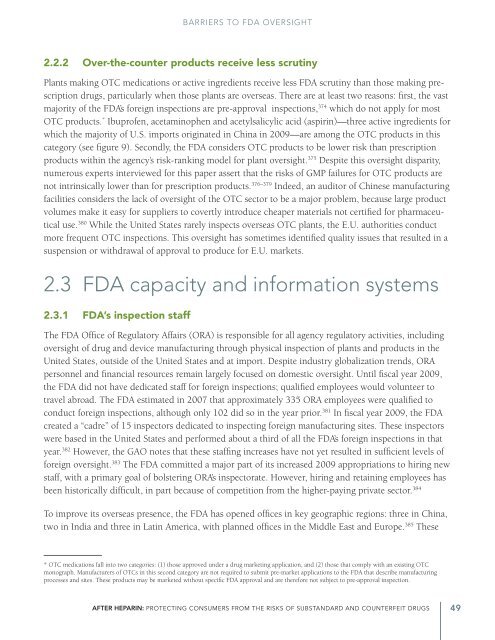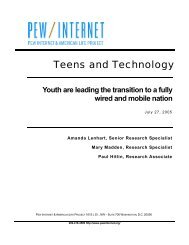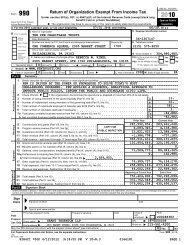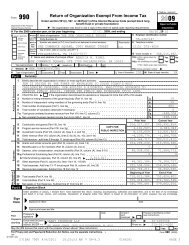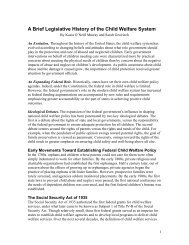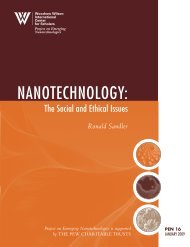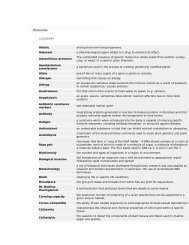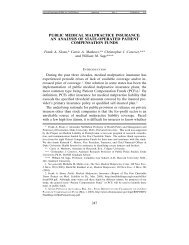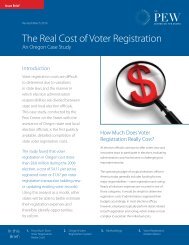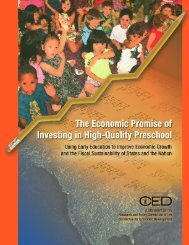After Heparin: - The Pew Charitable Trusts
After Heparin: - The Pew Charitable Trusts
After Heparin: - The Pew Charitable Trusts
Create successful ePaper yourself
Turn your PDF publications into a flip-book with our unique Google optimized e-Paper software.
BARRIERS TO FDA OVERSIGHT<br />
2.2.2 Over-the-counter products receive less scrutiny<br />
Plants making OTC medications or active ingredients receive less FDA scrutiny than those making prescription<br />
drugs, particularly when those plants are overseas. <strong>The</strong>re are at least two reasons: first, the vast<br />
majority of the FDA’s foreign inspections are pre-approval inspections, 374 which do not apply for most<br />
OTC products. * Ibuprofen, acetaminophen and acetylsalicylic acid (aspirin)—three active ingredients for<br />
which the majority of U.S. imports originated in China in 2009—are among the OTC products in this<br />
category (see figure 9). Secondly, the FDA considers OTC products to be lower risk than prescription<br />
products within the agency’s risk-ranking model for plant oversight. 375 Despite this oversight disparity,<br />
numerous experts interviewed for this paper assert that the risks of GMP failures for OTC products are<br />
not intrinsically lower than for prescription products. 376–379 Indeed, an auditor of Chinese manufacturing<br />
facilities considers the lack of oversight of the OTC sector to be a major problem, because large product<br />
volumes make it easy for suppliers to covertly introduce cheaper materials not certified for pharmaceutical<br />
use. 380 While the United States rarely inspects overseas OTC plants, the E.U. authorities conduct<br />
more frequent OTC inspections. This oversight has sometimes identified quality issues that resulted in a<br />
suspension or withdrawal of approval to produce for E.U. markets.<br />
2.3 FDA capacity and information systems<br />
2.3.1 FDA’s inspection staff<br />
<strong>The</strong> FDA Office of Regulatory Affairs (ORA) is responsible for all agency regulatory activities, including<br />
oversight of drug and device manufacturing through physical inspection of plants and products in the<br />
United States, outside of the United States and at import. Despite industry globalization trends, ORA<br />
personnel and financial resources remain largely focused on domestic oversight. Until fiscal year 2009,<br />
the FDA did not have dedicated staff for foreign inspections; qualified employees would volunteer to<br />
travel abroad. <strong>The</strong> FDA estimated in 2007 that approximately 335 ORA employees were qualified to<br />
conduct foreign inspections, although only 102 did so in the year prior. 381 In fiscal year 2009, the FDA<br />
created a “cadre” of 15 inspectors dedicated to inspecting foreign manufacturing sites. <strong>The</strong>se inspectors<br />
were based in the United States and performed about a third of all the FDA’s foreign inspections in that<br />
year. 382 However, the GAO notes that these staffing increases have not yet resulted in sufficient levels of<br />
foreign oversight. 383 <strong>The</strong> FDA committed a major part of its increased 2009 appropriations to hiring new<br />
staff, with a primary goal of bolstering ORA’s inspectorate. However, hiring and retaining employees has<br />
been historically difficult, in part because of competition from the higher-paying private sector. 384<br />
To improve its overseas presence, the FDA has opened offices in key geographic regions: three in China,<br />
two in India and three in Latin America, with planned offices in the Middle East and Europe. 385 <strong>The</strong>se<br />
* OTC medications fall into two categories: (1) those approved under a drug marketing application, and (2) those that comply with an existing OTC<br />
monograph. Manufacturers of OTCs in this second category are not required to submit pre-market applications to the FDA that describe manufacturing<br />
processes and sites. <strong>The</strong>se products may be marketed without specific FDA approval and are therefore not subject to pre-approval inspection.<br />
<strong>After</strong> <strong>Heparin</strong>: PRotecting Consumers from the Risks of Substandard and Counterfeit Drugs 49


